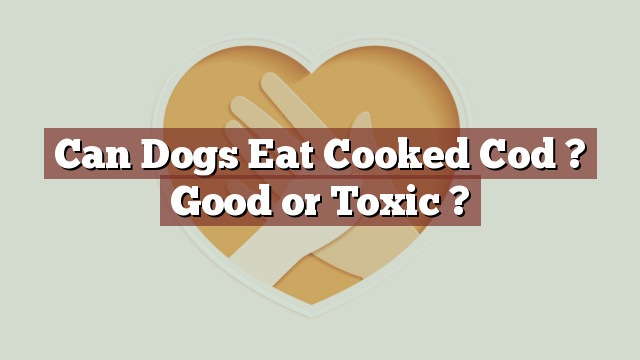Can Dogs Eat Cooked Cod? Good or Toxic?
It is essential to be aware of what foods are safe for our furry friends to consume. Dogs have different dietary needs than humans, and some human foods can be harmful to them. One common question that arises is whether dogs can safely consume cooked cod. In this article, we will explore the nutritional value of cooked cod, discuss its safety for dogs, and highlight the potential risks and benefits associated with feeding it to our four-legged companions.
Nutritional Value of Cooked Cod
Cooked cod is a type of fish that is often enjoyed by humans due to its mild taste and versatility. Not only is it a favorite among seafood enthusiasts, but it also offers several nutritional benefits. Cod is a lean source of protein and contains essential amino acids necessary for muscle growth and repair. Additionally, it is rich in vitamins and minerals such as vitamin B12, vitamin D, potassium, and selenium. These nutrients play a crucial role in supporting a healthy immune system, promoting bone health, and aiding in proper heart function.
Is Cooked Cod Safe for Dogs?
Yes, dogs can safely eat cooked cod. In fact, many commercial dog food brands include fish as an ingredient due to its nutritional value. However, it is important to note that the cod must be thoroughly cooked and served plain, without any added seasonings, spices, or oils. Seasonings like garlic and onion can be toxic to dogs, and oils used in cooking may cause digestive upset. Therefore, it is crucial to prepare plain cooked cod specifically for your furry friend, without adding any potentially harmful ingredients.
Potential Risks and Benefits of Cooked Cod
When cooked cod is prepared and served correctly, it can provide several health benefits to dogs. As mentioned earlier, cod is an excellent source of lean protein, which is essential for maintaining strong muscles and a healthy coat. The omega-3 fatty acids found in fish, including cod, can also contribute to a dog’s overall well-being. These fatty acids have been associated with a reduced risk of heart disease, improved joint health, and enhanced brain function in dogs.
However, there are a few risks to be aware of when feeding cooked cod to dogs. One potential concern is the presence of small, sharp bones that could pose a choking hazard or cause injury to the digestive tract. Therefore, it is crucial to ensure that all bones are carefully removed before serving cooked cod to your canine companion. Additionally, some dogs may be allergic to fish. If your dog has not consumed fish before, it is advisable to introduce it gradually and monitor for any signs of an allergic reaction, such as itching, vomiting, or diarrhea.
What to Do if Your Dog Eats Cooked Cod
If your dog accidentally consumes cooked cod and exhibits any adverse effects, it is important to seek veterinary advice promptly. Symptoms such as difficulty breathing, severe vomiting or diarrhea, or signs of choking require immediate medical attention. A veterinarian will be able to assess the situation and provide appropriate guidance based on your dog’s individual health and circumstances.
Conclusion: Cooked Cod can be a Healthy Addition to a Dog’s Diet
In conclusion, cooked cod can be a healthy addition to a dog’s diet when prepared and served correctly. It offers valuable nutritional benefits, including lean protein, vitamins, and minerals. However, bones must be removed to prevent choking or injury, and dogs with fish allergies should be introduced to cod cautiously. As always, it is crucial to consult with a veterinarian regarding your dog’s specific dietary needs and any concerns you may have. By providing a balanced and appropriate diet, we can ensure our beloved pets stay happy and healthy for years to come.
Thank you for investing your time in exploring [page_title] on Can-Eat.org. Our goal is to provide readers like you with thorough and reliable information about various dietary topics. Each article, including [page_title], stems from diligent research and a passion for understanding the nuances of our food choices. We believe that knowledge is a vital step towards making informed and healthy decisions. However, while "[page_title]" sheds light on its specific topic, it's crucial to remember that everyone's body reacts differently to foods and dietary changes. What might be beneficial for one person could have different effects on another. Before you consider integrating suggestions or insights from "[page_title]" into your diet, it's always wise to consult with a nutritionist or healthcare professional. Their specialized knowledge ensures that you're making choices best suited to your individual health needs. As you navigate [page_title], be mindful of potential allergies, intolerances, or unique dietary requirements you may have. No singular article can capture the vast diversity of human health, and individualized guidance is invaluable. The content provided in [page_title] serves as a general guide. It is not, by any means, a substitute for personalized medical or nutritional advice. Your health should always be the top priority, and professional guidance is the best path forward. In your journey towards a balanced and nutritious lifestyle, we hope that [page_title] serves as a helpful stepping stone. Remember, informed decisions lead to healthier outcomes. Thank you for trusting Can-Eat.org. Continue exploring, learning, and prioritizing your health. Cheers to a well-informed and healthier future!

